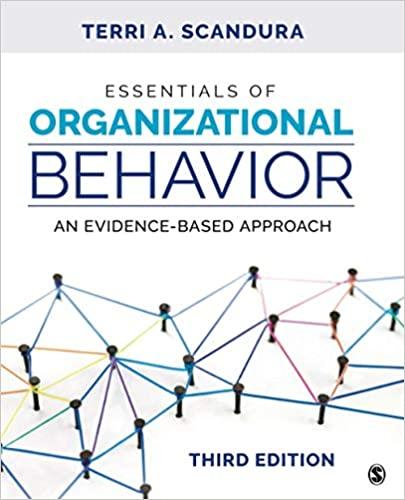Research indicates that leaders play an important role during change by supporting the change and taking part
Question:
Research indicates that leaders play an important role during change by supporting the change and taking part in its implementation. It has been argued that transformational leadership that is faked is not true transformational leadership. Leaders who lead transformation efforts exhibit leadership that depends upon (1) the moral character of the leaders and their concerns for self and others; (2) the ethical values embedded in the leaders’ vision, articulation, and program, which followers can embrace or reject; and (3) the morality of the processes of social ethical choices and action in which the leaders and followers engage and collectively pursue.60 Thus, ethical behavior is an essential underpinning of transformational leadership. But does such ethical conduct by leaders make a difference in satisfaction and performance during organizational change? A survey of 199 employees and their supervisors found ethical leadership matters in the context of organizational change.61 Technology changes were the change that was most frequently listed as having the most impact, followed by downsizing, and then restructuring. Other changes reported were relocations, mergers, process changes, and people-centered changes. These changes have a significant impact on employees’ regular work routines and cause stress. If an employee senses that their leader is behaving unethically, this may exacerbate the stress and result in lower performance. Followers need to be able to trust the integrity of their leaders during change. In addition, the degree to which employees felt that they were involved in the organization’s change process made a difference as well. For example, having leaders discuss changes with employees results in higher job satisfaction, performance, and organizational citizenship behavior during organizational change. The relationship of ethical leadership and resistance to change is explained by followers having a high degree of moral disengagement and being sensitive to unfairness. For example, after a mass layoff, an employee who was directly involved may try to reframe their involvement by
(a) portraying it as the ultimate best for the company (moral justification), deliberately not calling it a layoff but an “outplacement”;
(b) minimizing their role in the execution of the layoff by claiming they had to follow orders; or
(c) devaluating the individuals affected by their involvement, for example, through deliberately avoiding thinking of the layoff candidates as human beings whose lives will be severely impacted. However, when ethical leadership is higher, employees are less likely to engage in such rationalizations. The organization plays a role as well: Research shows that human resource practices that focused on commitment reduced resistance to change, but this depended on high levels of ethical leadership....
Discussion Questions
1. Do you agree or disagree with the statement that transformational leadership cannot be faked? Explain your position.
2. Why do perceptions of leaders behaving unethically create stress during organizational change? Consider the role of change uncertainty.
3. In addition to discussing changes with employees, describe some other actions that leaders can take to improve employee adjustment to organizational change.
Step by Step Answer:

Essentials Of Organizational Behavior An Evidence-Based Approach
ISBN: 9781544396781
3rd Edition
Authors: Terri A. Scandura





